“I owe the NCVH my life”: Tim Hibberd’s journey from darkness to joy

Army veteran Tim Hibberd had no idea he was living with complex PTSD until severe work pressures on the outside forced him to seek help. He wishes he’d known how transformational veteran support services could be – and that more people could access them.
By Caroline Riches
The following helplines are designed specifically for veterans and the family members of veterans:
- Open Arms 24-hour Support Line (1800 011 046)
- Australian Defence Force (ADF) All Hours Support Line (1800 628 036)
- Defence Family Helpline (1800 624 608)
Other general helplines include:
- Lifeline 24/7 Crisis Support (13 11 14)
- Suicide Call Back Service (1300 659 467)
At a glance:
- Tim Hibberd says his transition out of defence was “seamless” at the beginning, until work pressures led to his unravelling.
- Seeking professional help for anxiety attacks led professionals to discover the complex PTSD he had acquired during his time in the forces.
- A treatment program at the National Centre for Veterans’ Healthcare healed his wounds and transformed his outlook.
- Hibberd says he is now the happiest he’s been in his life, and he wishes more veterans could benefit from the centre.
Tim Hibberd knew that leaving the forces could come with its challenges. At first, he thrived, before plummeting into a dark hole.
After two decades in the Army, the latter part in 20th Regiment, Royal Australian Artillery in Brisbane, he left in 2020 to join start-up Infravision, which provides drone-enabled line stringing services for transmission, distribution and emergency response.
It was an exciting time – and a relatively easy transition given the large numbers of ex-Defence members at Infravision. But the work was intense, leading to anxiety attacks, before a personal crisis led to Hibberd’s unravelling and diagnosis of complex PTSD.
Hibberd, now 48, shares how the support of the National Centre for Veterans’ Healthcare (NCVH) helped him reshape his outlook on life.
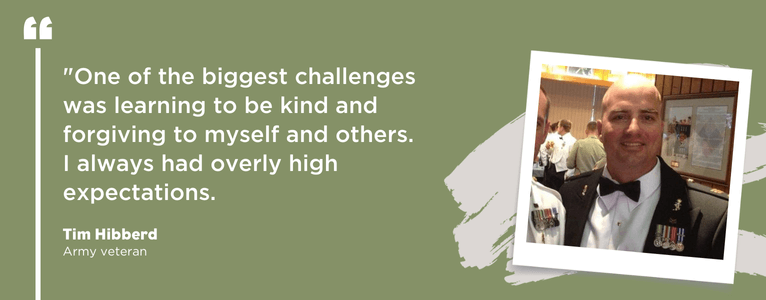
Falling into a hole
“The stress and pressure to succeed at work took its toll. At the same time, my wife accepted a promotion that required her to relocate to Melbourne. I decided to quit and find work down there. It was an opportunity for a new beginning.
“But during a phone call with a mate, when I was telling him we were in the process of packing up and moving, she interrupted, saying, ‘I’d rather go by myself without you’. Essentially, once we’d packed up the house, we were separating.
“So I had no job, had lost my wife, and was about to become homeless. I felt like my world had collapsed. I was probably 50/50 on whether I wanted to continue living.”
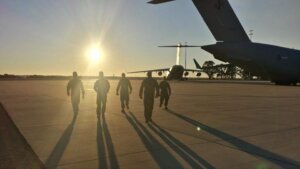
“My maintenance team at RAAF Base in Perth in 2014, after a long day loading three Blackhawks and all the support equipment into the C-17s in the background.” – Tim Hibberd
Getting help
“Ironically, my anxiety attacks had been my saviour, pushing me to connect with veterans’ and family counselling service Open Arms. They’d diagnosed me with complex PTSD and referred me to the NCVH in Sydney. I’d never heard of it but looked it up, and it sounded amazing.
“By chance, my assigned case manager, Kylie, called me up just when I’d slumped into my deepest hole. Sensing despair in my voice, she got me in quickly, and I started six months of treatment.”
Read how multiple regional RSL sub-Branches banded together to help a veteran in need.
Joy and meditation
“I loved the diversional therapy the centre offers, which provides positive experiences to take your mind off all the confronting stuff and bring moments of joy – like mindfulness practices. I enjoyed free guitar lessons and scuba diving, but it was the daily meditations that truly transformed my outlook.
“I was such a high-tempo, outcome-driven individual, always on the go. My brain was the same. A 10-minute meditation each morning gave me the time and space to slow down, and analyse my emotions and thoughts from a distance. I learned that while they’re a part of my life and history, they don’t define me.
“It was like watching boats but not having to jump on and sail with them.
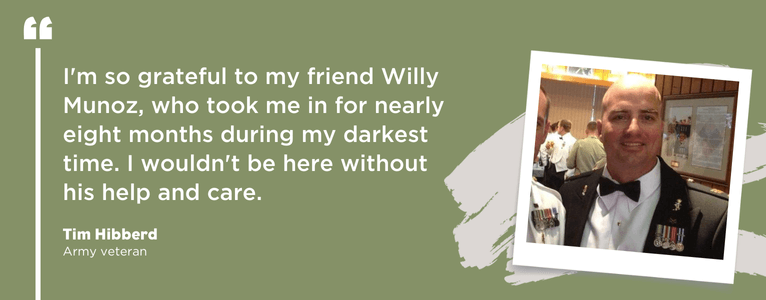
“I also went through the hard stuff – opening up some very raw wounds and addressing them, and did a workshop at PTSD Reboot, which helps people heal from trauma.
“One of the biggest challenges was learning to be kind and forgiving to myself and others. I always had overly high expectations and when people failed to meet them, I became frustrated and irritable.
“Understanding that was a lightbulb moment. Why would I expect that of myself and others? Softening that perspective, and allowing myself and those around me to be human, took so much pressure off.
“The support of others was also vital. I’m so grateful to my friend Willy Munoz, who took me in for nearly eight months during my darkest time. I wouldn’t be here without his help and care.”
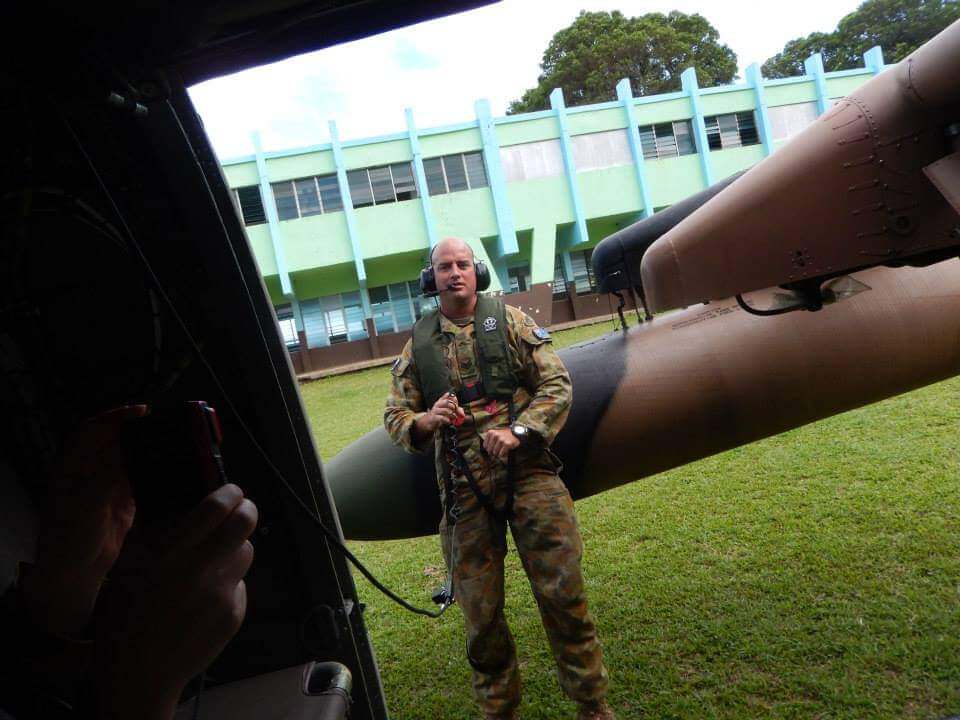
“I’m leaning against the external fuel tank of a Blackhawk in Vanuatu during a cyclone recovery mission in 2014.” – Tim Hibberd
Moving forward
“One day, during a session with my psychologist Melissa, I felt both happy and sad to admit I was done with treatment. I told her I’m the happiest I’ve been in my life, that I literally live in a day-to-day state of bliss.
“I now work for another startup OCIUS Technology, which supports the Navy through maritime drone development. I’m providing meaningful strategic defence to the nation, and if that’s not enough purpose for a former serving member, I don’t know what is.
“My outlook on life and on myself has flipped 180 degrees, and that positivity is being radiated back to me. Good people attract good people.
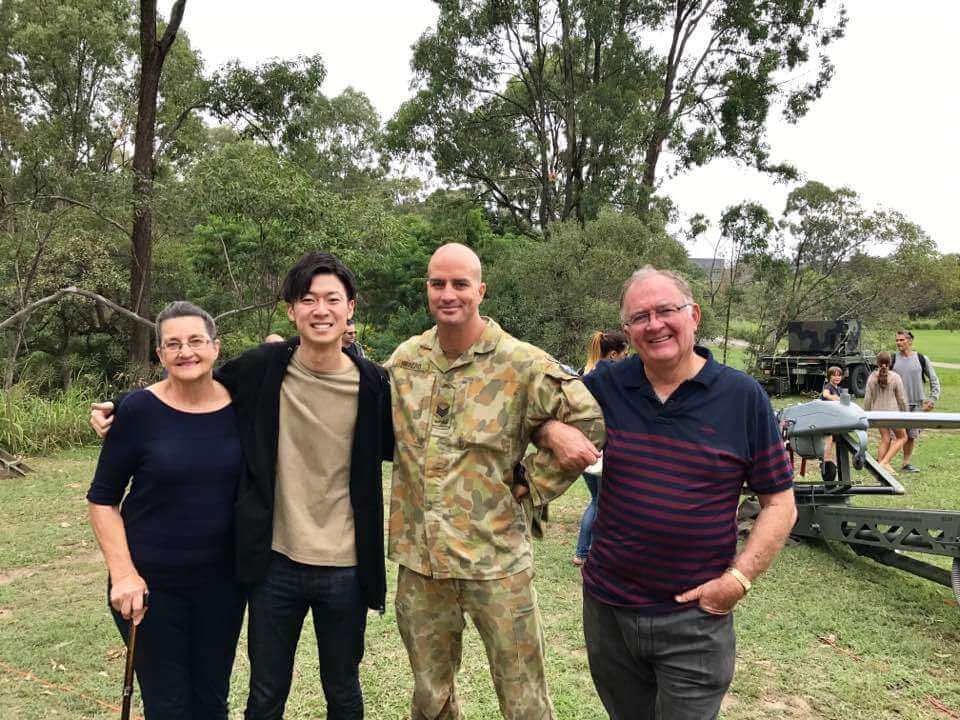
“My parents brought one of their home stay students along to a 7th Brigade open day in Brisbane.” – Tim Hibberd
“Not many serving members and veterans know about the NCVH. I wish there were more centres around Australia. Treatment and support tailored specifically to veterans is priceless – having professionals who know the lingo, understand the idiosyncrasies.
“To any person who needs help, I would say reach out to NCVH and meditate every morning. That’s it.
“I literally owe the NCVH my life.”
The National Centre for Veterans’ Healthcare is Australia’s first comprehensive care centre offering specialist physical and mental healthcare services for veterans.






